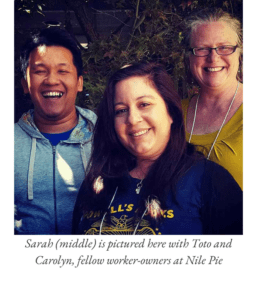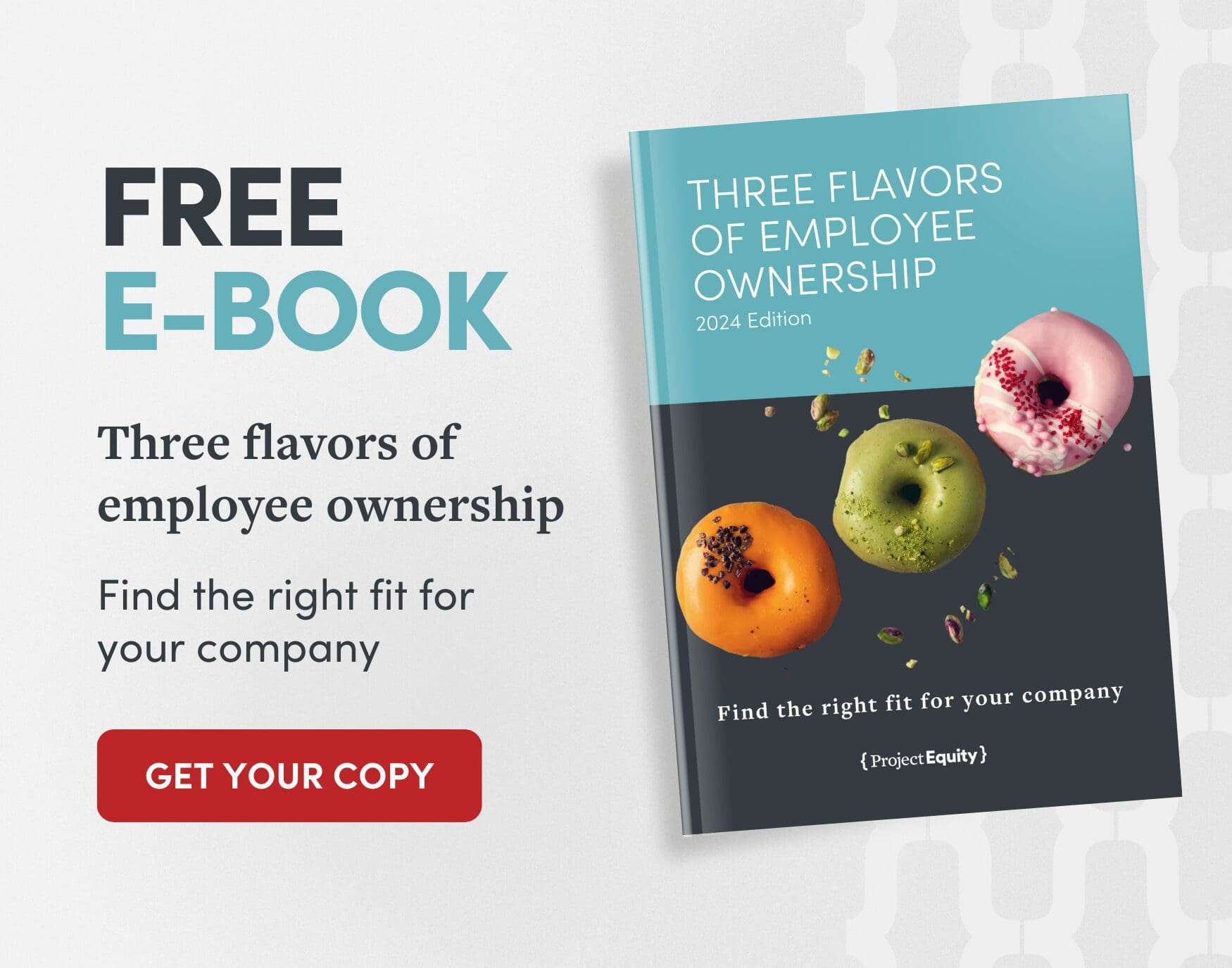Niles Pie: Sarah’s Story
- California
 This is an interview with a worker-owner at Niles Pie in the San Francisco Bay Area, Sarah Vegas, who is a single parent to 11-year-old Attison.
This is an interview with a worker-owner at Niles Pie in the San Francisco Bay Area, Sarah Vegas, who is a single parent to 11-year-old Attison.
Due to the irregular hours and pay in her previous restaurant jobs, Sarah struggled to provide and be present for Attison in the way she wanted to be. It was a turning point in her life to receive a substantial patronage check just six months after Niles Pie, her current workplace, became a worker coop. One of Sarah’s proudest moments was showing the check to Attison and letting him choose something he wanted to buy with a small piece of it. “You had to sacrifice too for me to become a business owner,” she told him.
For Sarah, worker ownership means that her small family is financially secure and that she can balance her career with parenting. It also means that her son is proud that his mom is an owner and a leader of a business.
Q: How long have you worked at Niles Pie?
Sarah: I will have been at Niles Pie for five years this coming summer. I had been at a restaurant where Carolyn supplied them with pie and biscuits, and she jokingly said “if you ever get tired with this place, come work with me.” I just showed up one day and said “is this offer still good?” And I’ve been here ever since
Q: How is this company different than previous jobs you’ve worked?
Sarah: it’s a different pace, more predictable. When my son was in the first grade, I worked in a restaurant from noon or 3 to midnight. Some days I would get him to school and I wouldn’t see him that whole day; when I got home, he’d be in bed. Fortunately, my mom was helping me out, but that’s a lot to ask of somebody. Baker’s hours are better and more predictable.
Q: What is different now that you are an owner? What is the same?
Sarah: My job is essentially the same, but I do have that added level of having an ownership mentality. You can’t make excuses like “well, nobody told me that needed to be done,” or “I didn’t notice that needed to be done.”
You know what goals you’re trying to hit. You know about the parameters, the budget, your labor costs, because it does affect your bottom line. In a way I’m just being a good employee—for myself—because in a way, you’re working for yourself. You’re trying to do the best you can because you want this company to be successful.
What’s different now is that I feel more secure. I’ve worked in restaurants where you show up to work and there’s a sign on the door that it’s closed forever. It’s not that uncommon, really.
My son is so proud that his mom has something that she owns; something that she’s a part of. It’s not just a job. If I’m going to be working hard, it’s nice for him to see why. He gets it and he understands. That’s really what is my driving force.
Q: What was the scariest thing for you when you started the process to convert to a cooperative?
Sarah: Just not knowing or understanding what it was going to look like and knowing that you are entering a different relationship with your employer. That’s tricky because the lines are sort of blurred. People have their roles when you’re an employee and you have a traditional boss. [So, with the coop transition], I thought I don’t know how this is going to work out; if I’m going to be heard; if I’ll feel fulfilled as I hope I will be, in going through this process.
Also, the concept of a cooperative was foreign. I had heard of them but really didn’t know anything about them.
Q: What has been difficult that you thought would be easy?
Sarah: In a typical business, you’re trying to be a good employee with a strong work ethic for your boss. The boss is the one telling you what is expected; what you need to get done. Flipping that a little bit and having a different role where you’re suddenly expected to know a lot more about the business side of the business, not just your job, has been interesting. Being expected to give feedback and asked if this seems feasible to you; is this budget OK? Having to raise your voice about things that not everyone will agree about.
An employee who would raise their voice would be insubordinate; not every boss wants to hear what you think will make the business better. But here, we’re all working toward this goal of growing the business, being more profitable, and our mission of providing a better quality of life for our employees.
It was harder for me to say this is really what I think and speak up when I didn’t really know if anyone wants to hear me. It’s been a good exercise for me, in being a little more assertive.
Now, people hear that I’m doing this and they have a lot of questions for me. Before I’ve always thought they saw me like “she’s a kitchen person, she’s hiding away in the dark noisy kitchen.” But now, I have some knowledge and some expertise in an area.
At work, now that we have new people coming on board [as worker-owners], you can be looked to in a leadership role as opposed to just, Sarah the head baker.
Q: What do your family and friends think of you being an owner now?
Sarah: My family has been pretty excited because they know that I work hard. My mom, in particular, is so proud of what I do. Even my chef jobs that I’ve had in the past, I always felt that they’re not that great. It’s long hours, it’s low pay, it’s a little rough; but now I’m like, “Yeah!” I think my family looks at me as someone who has a business. I feel a little more adult; that sounds silly, but I have something that’s mine, and that’s important to me. That’s really great for somebody’s career. It’s nice to be able to have that.
Q: Tell me more about your son and what this has meant for him and for you as a mom.
Sarah: The stability that it’s created is really nice. I felt secure in my job at Niles Pie because it was a strong company before the transition, but now it feels even more stable. And I can show Attison that the hard work I do pays off.
We just got our patronage checks last week and I told Attison, you’ve had to sacrifice while I’ve gone through all of these trainings and meetings. What do you think? I want you to get something with this check too. I don’t know if I’ve ever had a time in Attison’s life where I’ve had a chunk of money. It was really nice to show him. In our little family of Attison and me, I’m really open about finances; why we can afford this; why we have to save up for that.
So, I told him, “Let’s get you something that you’ve really wanted.” He was like “Oh wow. OK!” It was nice to say that you work hard and you get something to show for it!
Sometimes it can be hard for kids who have parents who work weird or long hours, or on the weekends, when all the other parents work regular hours. So it helps to be able to show that it’s worth it.
Q: What is your dream for the business?
Sarah: My dream for the business is to be able to provide all of our worker-owners with a living wage and a sense of belonging in our Bay area community. And also, if you work at Niles Pie, you have a career but also, if you suddenly decide you want to move to Washington DC or something, you have a foundation and a basis in knowledge of an industry that you can take anywhere and have a job, have a career, have a way to support yourself.
Q: What would you tell someone who was considering turning their business into a cooperative?
Sarah: I would say, do your research and go in with your expectations grounded in reality. The most important thing is taking the long view.
Ownership story details
Transitioned
Not applicable
Employees
Not applicable
Industry
Type of EO
Topic
Not applicable


